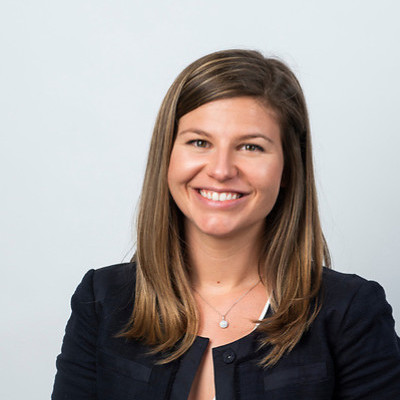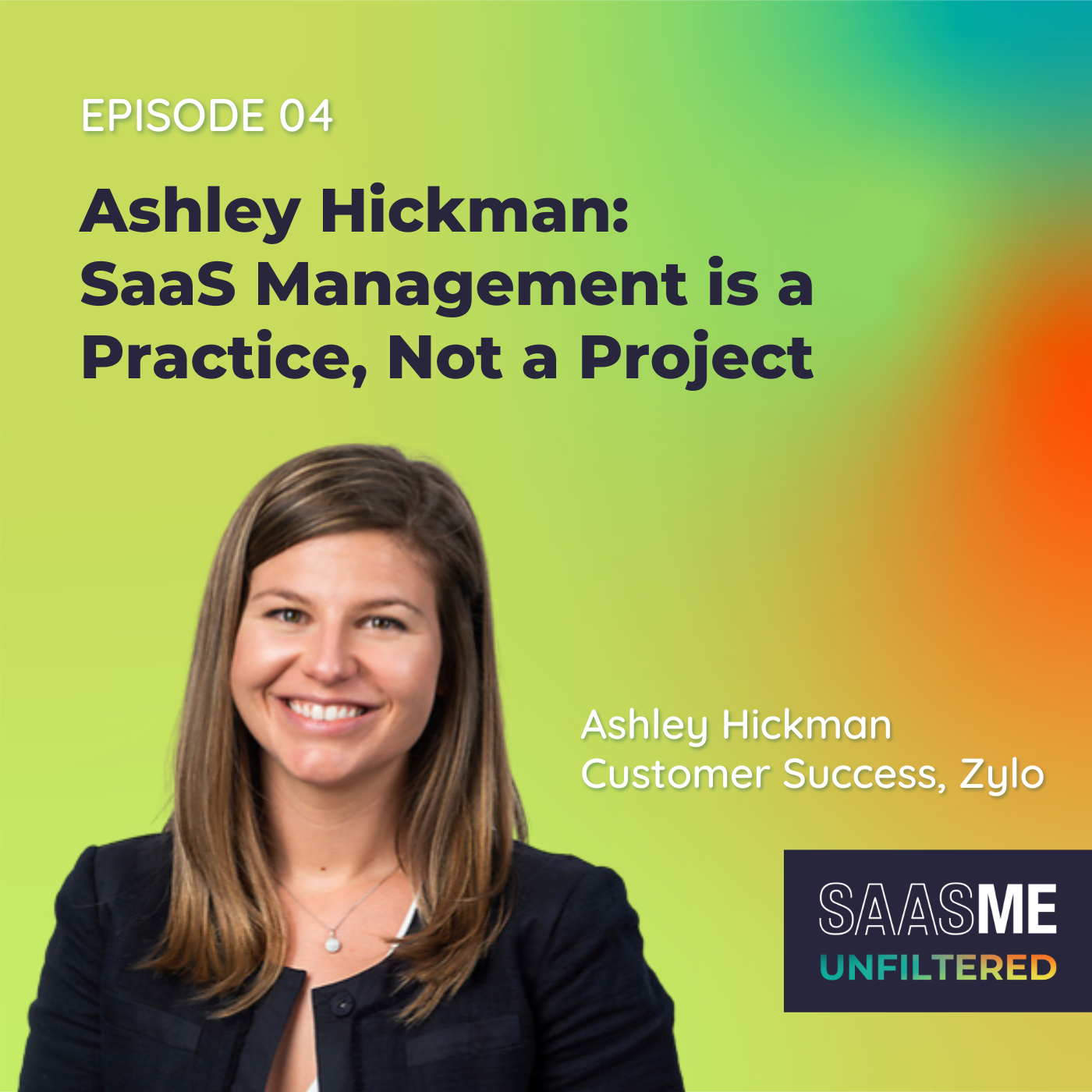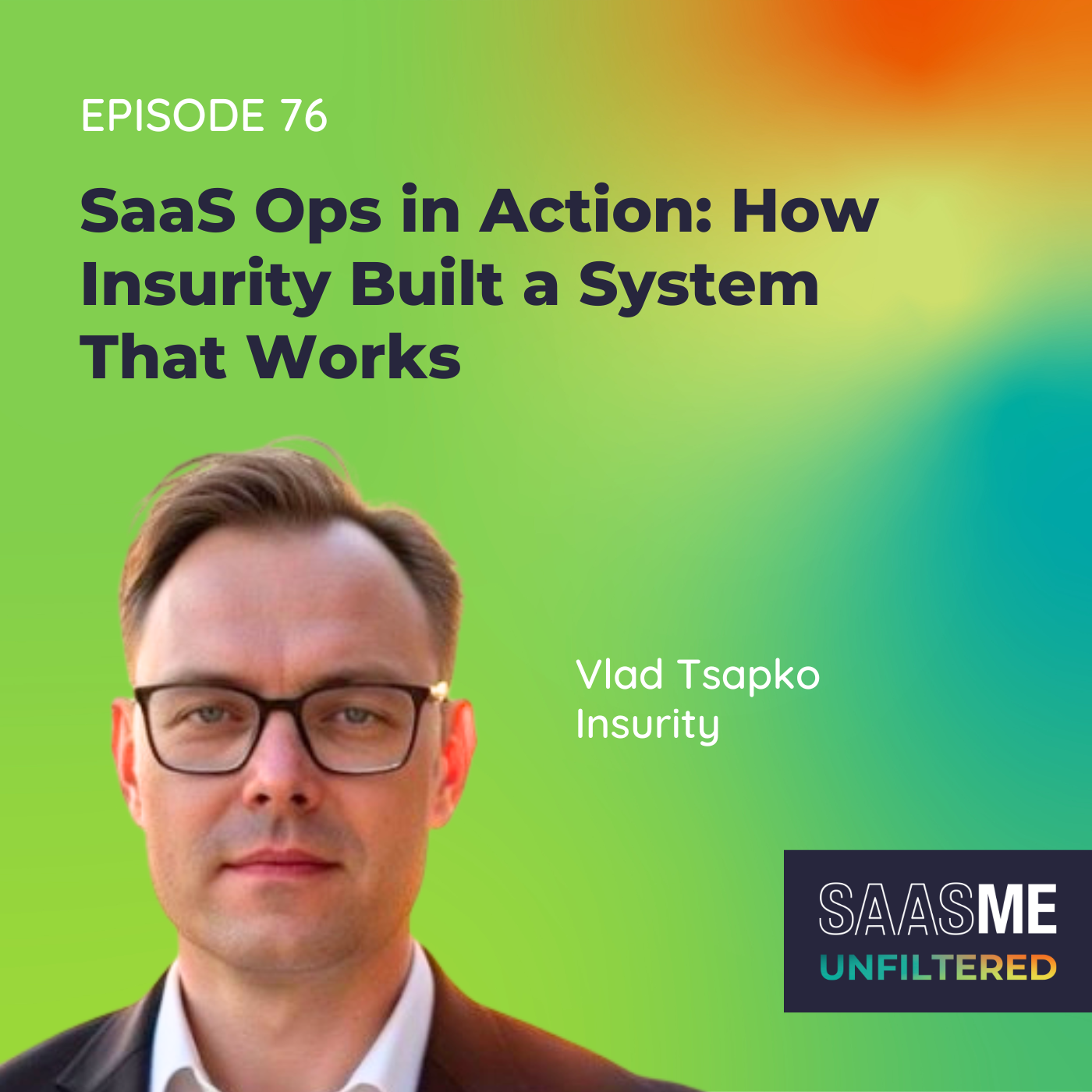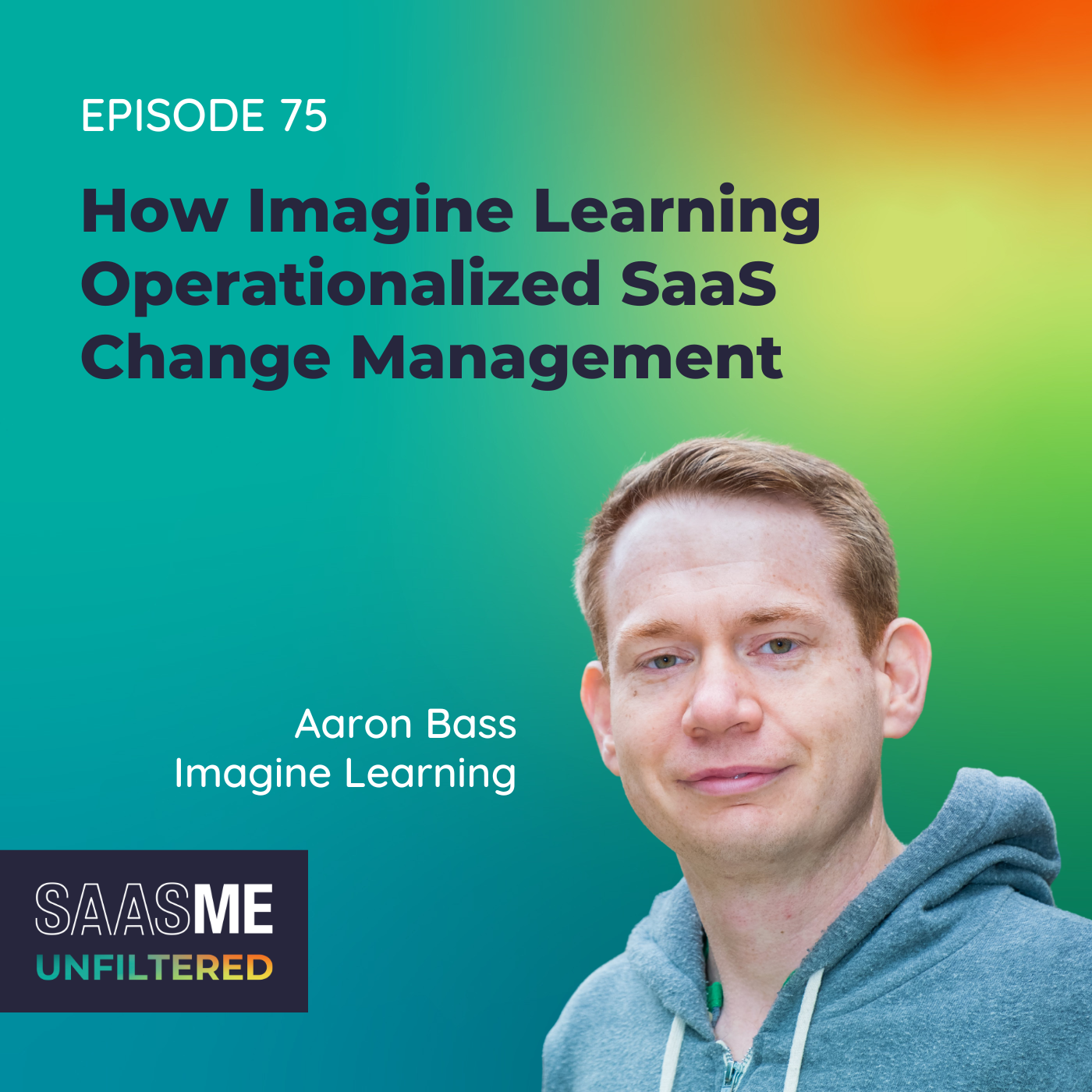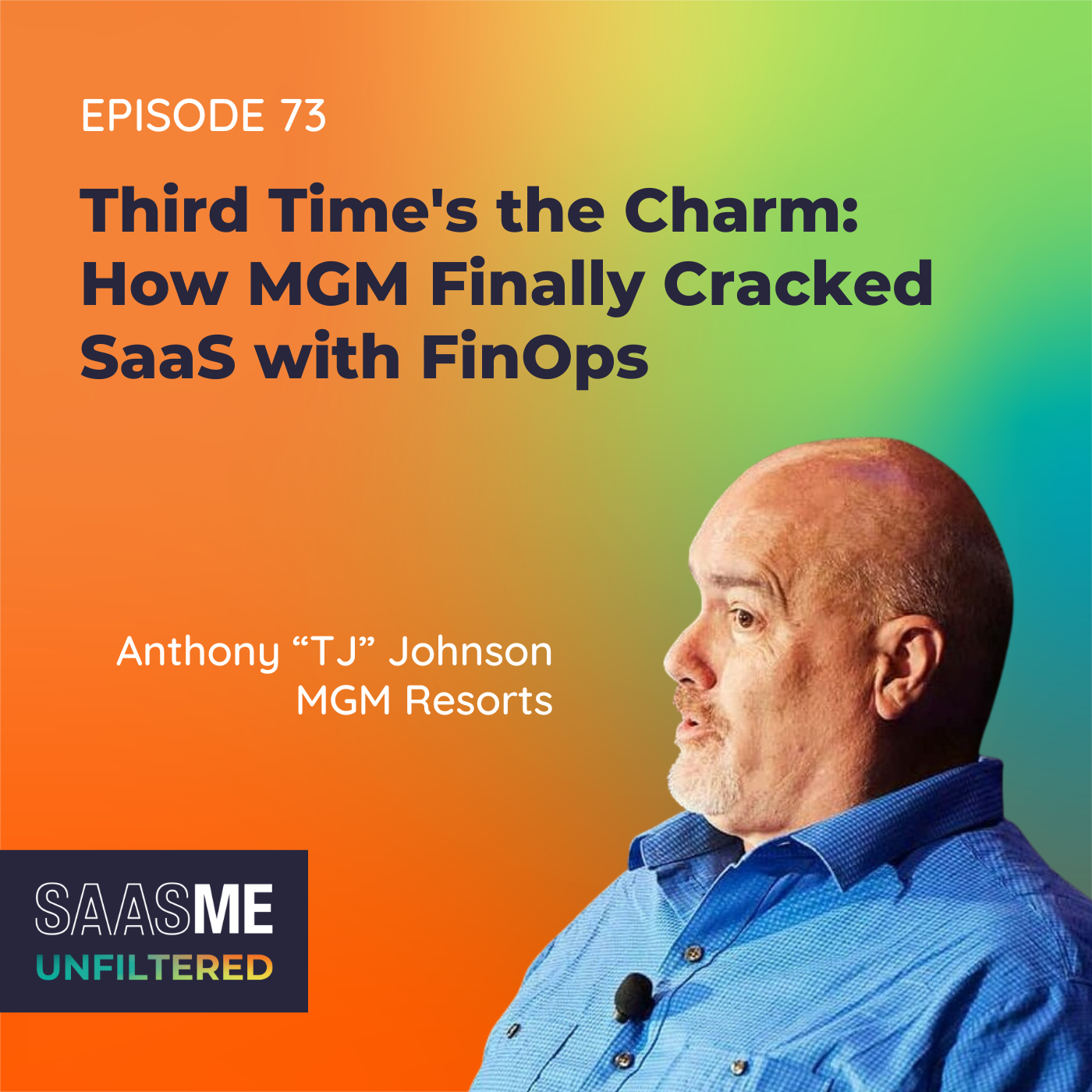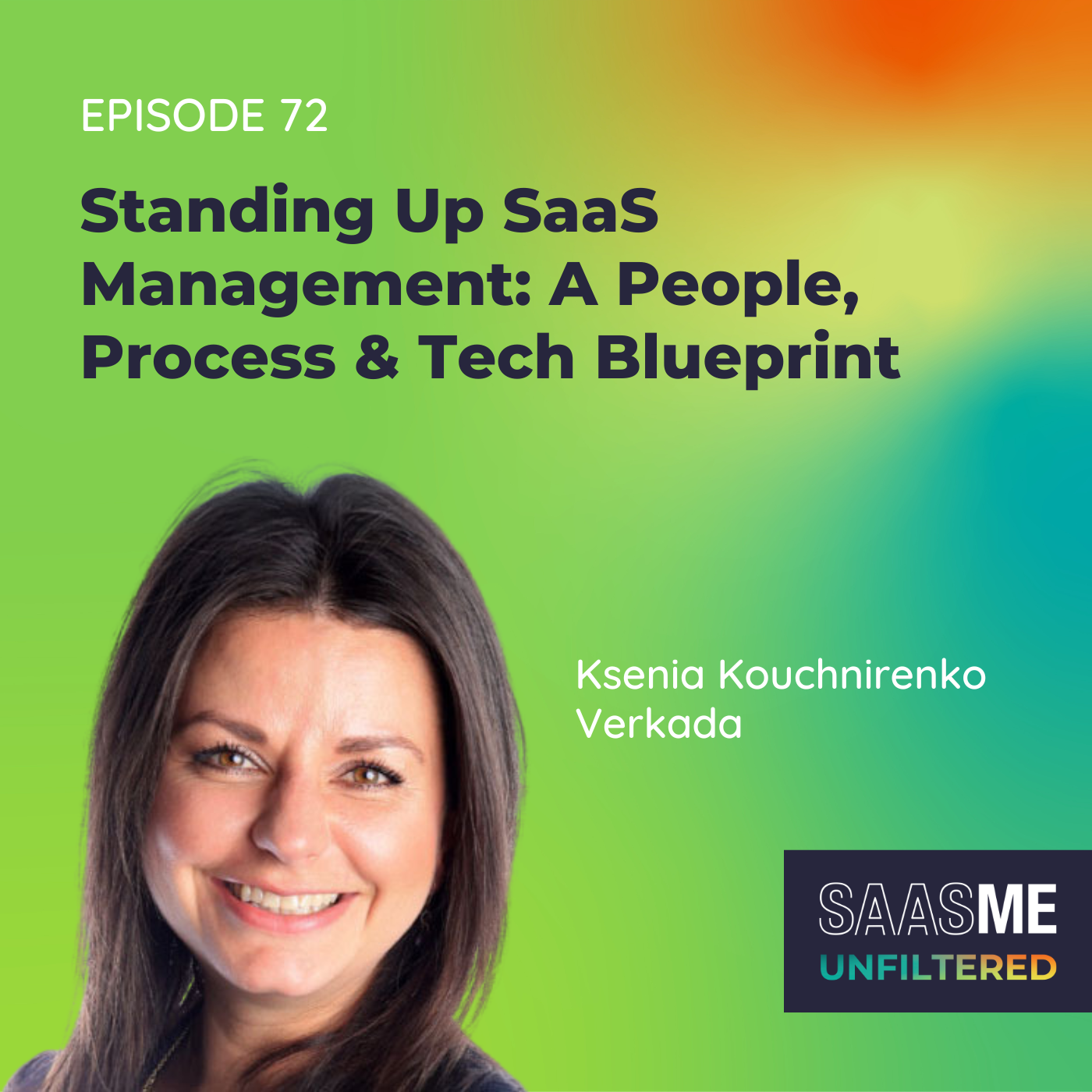Ashley Hickman: SaaS Management Is A Practice, Not A Project
- 0.5
- 1
- 1.25
- 1.5
- 1.75
- 2
Ashley Hickman: You don't know where to start if you don't know what you have, how can you best organize it? And really making sure that you can organize all of your licenses so that you can lead to optimizing. Optimizing really your stack, your portfolio towards what ultimately is your vision and goals for the business.
Cory Wheeler: Hello, hello, and welcome to SaaSMe Unfiltered, the SaaS management podcast, the show with give it to you straight, real life advice from pros knee- deep in SaaS every single day. SaaS management superheroes just like you. Welcome back to another episode of SaaSMe Unfiltered. So glad to have you join us this week. I'm Cory Wheeler, co- founder and chief customer officer here at Zylo.
Ashley Hickman: And I'm Ashley Hickman manager of customer success at Zylo.
Cory Wheeler: Well, we are very excited to welcome our special guest for today's episode. This professional, I'm very close with, I've worked with this person for a little while now, began her career in software sales interestingly enough, which I think has a lot of parallels to SaaS management with Cvent. Then spent many years in IT consulting. But not only that, she's got her master's in Italian, she's actually taught Italian to undergrads previously. What other professional has their master's in Italian and is also a very, very effective project management, professional and certified scrum master? I am speaking about none other than our very own Ashley Hickman. So, Ashley, welcome, great to have you here on the Unfiltered podcast to dive into your background.
Ashley Hickman: Yeah, yeah. Happy to be here. I was just around, so made sense to pop in today.
Cory Wheeler: Well, that's fantastic. Well, I'm excited to dig into several different concepts with you today. As we talk about, on this podcast, we've heard from a lot of leaders around how they're building SaaS management, what that value is inside their organization. And your perspective is really going to help round out how we think about SaaS management as well. But before we do that, I want to understand some of those passions that you've got today as well. I just touched on it. You've got your master's in Italian. So talk to me a little bit about that. Have you been to Italy? Have you really immersed yourself in it? And speak a little bit to that background passion.
Ashley Hickman: Italian. Overall, this is something that I'm sure will spend time digging into today, but I've had a lot of curiosities in my life. Especially in my professional career. I've tried a lot of things out and something that I decided when... And also I like to challenge myself. So, when I went to college, I decided I wanted to learn another language. Italian was at noon every day. French was at 8: 00 AM every day. So, I chose Italian, chose the smart path and truly enjoyed it. I loved it. And that was from my first semester of college until the very end. So I had an opportunity to, yes, immerse myself, been to Italy a few times and really just built a lot of great relationships out of it, learned a lot about the culture, learned a lot about grammar in the course of learning the Italian language. So, overall it was a really great experience for me, a great passion and ultimately led to me getting a master's in Italian. It was really a passion project, was figuring out what I wanted to do, what I didn't want to do and had an opportunity to dive into Italian for two years and teach Italian 101 and 102 at UVA.
Cory Wheeler: Well, that's great. Do you have another follow- up trip plan? When is the next time? Or is it on the list to be headed over there again soon when you can make it?
Ashley Hickman: Yeah, definitely on the list. So, had a little pause here during the pandemic, doing a lot of traveling, but that is something hopefully in the coming year or so have an opportunity to go back and hopefully with some friends and see some friends over there.
Cory Wheeler: One of my favorite places I've been in the world as well. I've got that as to do with my family to take everybody over. It's just beautiful. What's your favorite part of Italy?
Ashley Hickman: Definitely Southern Italy. That's where I spent a lot of time. A lot of people tend to spend time in Florence or other parts of Northern Italy, which are beautiful, wonderful. A lot to be said there. But I did have an opportunity to spend some time in Lecce, which is the heel of the boot, and a lot of other places in Southern Italy. I have a good friend in Naples, who's from there, spent some time in Sicily and I just love the food down there, the people, it's very different, it's truly a different language. So, you know Italian and then there's Napolitano or whatever the dialect might be. So, that was something that I've always enjoyed. And Southern Italy's just gorgeous. So, definitely one of my favorites.
Cory Wheeler: 100%, yeah. Well, I think as I did the introduction, I walked through your impressive background. I'd love to understand and let the audience understand, how are you translating that background? What are you doing today at Zylo and how does that background really translate into the role that you're executing on today?
Ashley Hickman: Yeah. So that, I mean, I will say we don't have any, not yet, Italian customers, a Ferrari or someone else wants to talk to us, let us know. So, not directly using my language skills, but I did just have an opportunity over the course of learning the language. And then, in grad school, for two years, I was basically doing public speaking and communicating to my professors, to the students that I was teaching. And that was a really great opportunity for me to just kind of work that muscle and speak with people. It also really led me to, as you mentioned already, my next role, I was all about trying things out. That's what I've done my entire life. So, trying out, I decided after learning Italian and really devoting myself to that really at that higher level, at the graduate level, I wanted" business experience," whatever that meant, I wanted business experience. So, I went to actually the career fair at UVA. I found Cvent, they're right out here. I live here in Northern Virginia, they're in Northern Virginia and ended up diving into that and figuring out what is tech? Tech software? I was aligned with our enterprise customers. So, that was just learning their business, their business problems and how Cvent's technology was able to help solve that.
Cory Wheeler: The background at Cvent and SaaS sales certainly plays a really direct role into SaaS management, the procurement of SaaS, the buying of SaaS in a distributed way and the operations and the administration around all of that has really changed how companies are managing one of their most important assets internally. So, that's fantastic. Then, how did your work in IT consulting translate in as well?
Ashley Hickman: Yeah. So, again, was looking to try some stuff out. So, I did go to a smaller consulting shop and was there first for sales, but very quickly was learning the business. I'd been a very curious person and always interested in how things are done, how people ended up in the roles that they're in and all of that. So, very quickly caught on to all the different projects they were doing. It was a custom shop, a Microsoft partner. So, all the technologies, all the solutions that we were building off of were Microsoft for the most part. And every project was unique, because everyone's environment, their technology, their setup, their architecture, everything was unique. And I loved that challenge of how are we going to go in? Customers would come to us or clients with the problem. So, it's like," How are we going to figure this out?" There was no blueprint for anything. I really loved that. It was definitely a challenge, not going to lie. It was a grind, but I loved figuring out like," Hey, they're coming to us with this huge problem. How are we going to solve it?" And often, with Microsoft, figuring out a lot of stuff on SharePoint, leveraging some automation technologies. So I had the opportunity to do a lot of project management, do some business analysis work. So, definitely more on the functional side, a lot of testing, but that was a great experience for me to work with just an incredible team. Everyone was wicked smart and I learned so much during my time there. Yeah, it was a really good experience and something that I've been able to carry now here at Zylo.
Cory Wheeler: I love that. Okay. Well, today, a little self- promotion here, today is one of my special days. Today is six years to the day from when I came on board and launched Zylo with a few of my co- founders. So, I'm pretty introspective about the early days of SaaS management. And when I think about that, six years has gone very, very quickly, but we are still very much in the early stages of SaaS management, specifically within the enterprise. So as you think about translating your knowledge of software and then your knowledge of IT and what they're looking to solve for in those problem points and being in the early days of SaaS management, how do you view that? What are your favorite parts about being in early and helping shape this in the industry?
Ashley Hickman: Everything that you're speaking to, Cory, that's why I'm here at Zylo. I had one conversation with you and I'm like," I should probably consider coming to Zylo." So, I think a lot of people feel like that when they talk with you, Cory, you're very passionate about SaaS management. So, that's something that really drew me to wanting to be a part of something that building something and specifically going back to all the work I did previously, which was very custom, was getting a problem set and how are we going to figure out? How are we going to solution towards it? How are we going to build it and ultimately deliver? So, that's something that being able to do that with SaaS management, because on a lot of my projects that I was working on previously, we'd always start out with, what are you using? What do you have? And people couldn't answer the question. You would have, well, let's get marketing on the phone, let's get IT. Because IT, they think they know everything, they think they're managing" everything," depending on the setup, et cetera, we worked with a lot of IT orgs that thought they, from a governance perspective, that like," Yeah, we own all the applications." And they're just using X, Y, Z. And was very quickly not the case. So, I saw that problem every day with what I was doing. So, the opportunity to go to a product company and really work on the bringing what is SaaS management, defining that practice, defining those best practices, those processes, et cetera, with such a strong technology. And that's something I've enjoyed here is how to define that with our really partner, with our customers, and define that for them?
Cory Wheeler: So, this is all fantastic detail. Now, I relate this as you're going through solving problems and understanding the customer. And I think there's a collaboration approach that you'll probably talk to a little bit as well. But the first question, when we go on board with our customers is, oh my gosh, how does my data stack up against other customers? And where are all the problems that we need to identify? But then once we go live, the customer says to us," What do I do? You have shown us visibility that we've never had. You've discovered everything across our environment. You've identified all of these opportunities that we should be actioning on, but what do I do?" And you've really been at the forefront of being able to do that for some of our largest customers, where you've really moved things forward is establishing a SaaS management practice. How have you done that with some of the largest customers that you're working with today?
Ashley Hickman: Yeah. Great question. So, that is, I think, first and foremost, for anyone when you're working with a team or like, hey, we're a vendor, we're working with our customer, listening to what they care about most, you can't boil the ocean. So, that, to your point, Cory, people go live with a tremendous amount of data and where to start. So, helping shape the direction of what their journey is going to look like, what they're going to prioritize is something that I've really enjoyed and having that opportunity to do so. Most recently we have a very, not recently, been working with them now for going on year and a half, but we have a very large pharma company that really we've taken a more traditional asset management team. And they are the whole reason that they've engaged with us, partnered with us is that there has been this tremendous shift from on- prem to cloud solutions. So, partnering with that team and helping them on that journey of their focus traditionally has been on- prem and what do they need to focus on now with SaaS? And helping them establish what that governance needs to look like, how that needs to be enforced, et cetera. So, that's something that really that's been a great opportunity is figuring out what that journey looks like for them, especially with pharma, there's certain regulations that they have to be beholden to. So, really teasing that out with best practices as well as our technology. That's certainly something that, yeah, has been really great to see, because, I mean, they're just kicking ass now. They're really crushing it. They're very far along in terms of where they started and where they're at today. Have a really great team. They have buy- in from the top. They have really collaboration across the organization to get to their goals and objectives as a business.
Cory Wheeler: Yeah. That's great. That's creating a practice. SaaS management is new across all of our customers, the establishment of processes, governance, controls around all of that. And really just the strategy is brand new as well. I love that example that you provided, following up on that example, a lot of customers ask us to back that with data and to be able to help them understand where they might be out of line in the market, where their beginning stats seem like they could be something to monitor and track over time. And maybe talk a little bit about how we bring data together with a journey and with that practice and that establishment to be able to put that full strategy together.
Ashley Hickman: Yeah, absolutely. So, that's something that whenever you're making a business decision, you need to, I think everyone knows. Or if you're in that seat right now, you have to have that data to support whatever outcome or goal, what's your finish line. Whatever you're trying to look to solve for. So, that's something with any SaaS management provider, you're coming to the table, you have a lot of data and then it's like, what to do with it? So, something that recently we went to market with just here at Zylo. And I want to say was December inaudible January timeframe was essentially benchmarks. We have a benchmarking product and it really essentially goes into three tiers. But the whole point of it is that making informed decisions, not just saying like," We need to do this because... I don't know." Having some data to base their decisions off of are really important. Something also that a lot of customers ask us, and this is something that I saw it in my previous, like in consulting. And I definitely hear a lot from our customers now. Everyone wants to know what like," Well, how are your other customers doing it? How do other people doing it?" These are people like, you could be a small, 100 person company, you could be a 50,000 person enterprise, and it's the same thing across the board. So, with our benchmarks, Zylo benchmarks, that's where we have that opportunity to leverage the data that we have against a subset... Essentially their data or a cohort, depending what it is. But that's really where we see our customers specifically. We have a very large SaaS company, who leverages our benchmarks really at that portfolio level. So, looking at where they stack against that question I was speaking to earlier is like, how are we doing against X, Y, Z? People always want to, people are measuring themselves up. They want to be best in breed with what they're doing. And that's something that, looking at the portfolio level, are we high when it comes to expense? Are we high when it comes to maybe specific areas of spend? So, that's something, starting the portfolio all the way down to price benchmarks. Of course, that's important as well. Everyone wants to know they're getting a good deal. That's something we hear a lot from our customers like," How do I know that I'm not getting screwed over?" Right?
Cory Wheeler: Yeah. Yeah.
Ashley Hickman: So, leveraging the price benchmarks, again, this large SaaS company, leveraging that when they're going in for renewals as well as net new purchases, when they're going in, entering into those large EAs or just really starting out with like," Hey, we're going to try this out before we look at something larger," and making sure that they're being very intentional with their net new purchases.
Cory Wheeler: Yeah. Data- driven confidence and confidence is important when we think about each of the different functional stakeholders in a business, they're all making independent decisions and they're doing so in a vacuum. Organizationally, I think, I'm a little long in the tooth from an experience perspective, but the days of really the only channel to be able to understand peer set data, operational data has been through different analysts channels. And that is usually siloed to a few people in the organization. So, the ability to open up this data set to really drive confidence, data- driven confidence for our customers executing on SaaS management has been a lot of fun. So, I love your perspective there. Let's talk a little bit about right now. What are you focused on? In your day to day in mid 2022, looking at the back half of the year, how are you focusing your customers and your team around that end goal of wild successful SaaS management deployments?
Ashley Hickman: A big focus right now for the customer success team and I would say... I mean, of course I'm talking about our team here at Zylo, but this is applicable to anyone undergoing a transformation when it comes to SaaS management or how you're managing technology within your business is figuring out what that journey is going to look like, what that focus is going to be and making sure it's an iterative process. So, that's something right now in terms of across our customer set, everyone's at a different starting point. And also, hey, we're all playing the same game. Some of us are playing a bigger game. Some of us are playing a smaller game. So, just figuring out for each and every one of our customers where they're at and being incredibly intentional about getting them to the next level. So, that's something we think about. What does SaaS management look like when it comes to setting up practice within your organization? Enterprise SaaS management, we work with incredible enterprise customers. So, there are definitely some specific needs when it comes to the enterprise, when it's truly at this tremendous, large scale. So, figuring out what to focus on when, we touched on that at the top, that's a really important focus and start for a lot of our customers. We specifically went live very recently with a life sciences customer and helping them establish a SaaS management practice from scratch. That continues to be. It's a big focus. Is like, they were literally told they were going to fail internally. And we went live right after implementation with a tremendous amount of savings and a tremendous amount of progress just right out of the gate. So, replicating that, seeing where we can replicate that across all of our customers who are going live. Then, for ones that are in different phases, looking at from an implementation perspective, making sure we're really harnessing the power of all the different data sources that our customers have. So, if it's that implementation phase, making sure we're maximizing, we have a great implementation team who's really focused on that. And then from a SaaS consulting perspective, are they looking to organize? Are they looking to optimize? Are they looking to orchestrate? It's kind of our framework that we have and really the focus for the SaaS consultants across our customers. So, organizing everything, you don't know where to start if you don't know what you have, how can you best organize it? And really making sure that you can organize all of your licenses, so that you can lead to optimizing. And optimizing really your stack, your portfolio towards what ultimately is your vision and goals for the business.
Cory Wheeler: That is a wonderful framework and a wonderful way to think through it, organizing the mess, optimizing by setting that programmatic optimization machine and then orchestrating that data throughout your environment. I think it's a well put way to think about SaaS management maturity in a business. What are the biggest dependencies there? So, certainly there are missteps that have happened within SaaS management, but how do you view the largest dependencies to being able to create a successful SaaS management practice optimization machine, really centralized governance of a decentralized category across your entire company?
Ashley Hickman: Where I've seen our customers be the most successful in defining, maintaining, sustaining their SaaS management program really comes down to two things. And some of this has come up like themes on other guests, Cory, that we've spoken with. So, the big thing, executive buy- in. So, having essentially leadership support, that's tremendously important. Not only like," Hey, yes, let's pick a SaaS management provider." Like," We need more than that." In terms of having a successful practice and making decisions. That's the biggest thing is that there are going to need to be... If you want progress, something needs to happen. So, some tough decisions are going to have to be made in some regard. So, having support from a leadership team or individual or sponsor is huge. That's really what ultimately is where we see our most successful customers are with when they have that support from leadership and then collaboration across the business. So, Brad spoke about this. Chris spoke about this. We heard about this with Sam as well. Other people that we've spoken with thus far, where we see, where I see, our customers be the most successful with whatever the vision and goal is? Because it is going to shift. It's going to iterate. It's going to change. They need to have collaboration across the business, across the teams. We've said SaaS is a team sport. That's very much true in the case and where I see customers being able to kick ass every day.
Cory Wheeler: Yeah. I think, as we've looked at the last six years, retrospectively, I think a lot of the optimization goals, whether that be increasing the adoption of your products or optimizing on spend, have been a little bit looser, I'll say. I think now what we are seeing in the markets is a slowdown. So, where a CFO may have played a backseat role to SaaS optimization, we're now seeing that CFO play a primary role. We really start to see where some of this economic slowdown is impacting some of our customers in terms of elevating what SaaS management has become. And this is a really important point in mid 2022, that I think every organization is looking at right now. And how we're using today, when we think about the economic climate and really the need for SaaS optimization that historically might be, give us better visibility, and now shifting into something a little bit more direct to the bottom line of most companies.
Ashley Hickman: Something that, and this has come up in the past few weeks with a lot of customer meetings, we are seeing people and a lot of people went through the great recession. People went through tightening their belts around the pandemic as well. So, people are being very proactive around seeing the trends in the market today and what that ultimately is going to mean a little bit longer term into this year and next. So, a lot of slowing down around hiring, of course, and therefore, if you're not bringing on as many people, maybe there's a temporary freeze. Then you're not needing to acquire new licenses. Then for, let's say, the technologies that you do have in place, to your point, the conversation has shifted, not for every customer, but it's starting to happen with our customers, especially depending the sector that they're in, being very intentional around optimization. Not just, okay, visibility, may have just been a big focus for them. It's now where can they be a little bit leaner? Can they be intentional around the technologies? Maybe the number of technologies they're using in a specific area, so rationalizing, or just optimizing when they're renewing or just currently what they have. There's definitely a... And we've seen it here in the past, specifically the past month, there's been a lot more conversations around leveraging a SaaS management platform to do that. And then especially the SaaS consultants, because we're here to support every single one of our customers. So, really helping them, again, tune whatever needs to be tuned there. A lot of that right now, to your point, it's optimization.
Cory Wheeler: Yeah. I think what we're seeing right now is the beginning of budgeting season. We're hearing from a lot of customers that budgets are steady. Budgets are static. Hiring is looking a little more static across many organizations now. The time for optimization is coming back into focus. Where the CFO and the CIO work in tandem to deliver that full strategy across software, across many of our customers outside of headcount, it's the number one line item it's opex, it's certainly flexible. So, usually, companies are looking directly at software as areas that they can optimize. They know a lot of the intrinsic challenges with software today. They know they have too many solutions overlapping and redundant solutions today. Where a year ago, moving from 13 different video conferencing solutions down to 10 was a little bit more of a political discussion. Now, it's becoming more of a budgeted activity that is an expectation that you move from 13 web conferencing products down to five and a need for optimization all around that is critical. So, at that point, data is everything. To be able to make those decisions, to be able to lean into your budget process and to hit those targets that CFOs and CIOs are now collaborating around, you've got to have that data. So, you're right at the entry point for a lot of our customers, in earnest, starting to run those optimization efforts to support the back half of'22. And what looks to be a little bit more of an uncertain time than history.
Ashley Hickman: Absolutely. And that's where having the data is huge. You don't have it, then you're starting with a spreadsheet and you're probably starting with a few spreadsheets.
Cory Wheeler: That's right.
Ashley Hickman: So, that's where, yeah, having it all automated, centralized in one location, there's a huge benefit from a time perspective. I mean, constantly we hear, we've spoken about it on a few other episodes of doing more with less, and then not only are you charged to do more with less, it's like," Oh, and we need to save a million dollars this year," or whatever it might be. Everyone has a different moving target and it is changing week by week. So, having the data there, that's huge. So, organizing all of it, when we think about going back to the maturity of where people are at, if they need to organize it, more focus on that, often though around optimizing it and how they can do that. We have a lot of ways that we can do that with insights and the ways that we're auto generating a lot of these recommendations of where they can be a little bit leaner and meaner. Then something that came up a lot in my conversations last week was benchmarks, because of course you have the data in your stack and then how can we actually start to get those benchmarks so that they're saving time? They don't have a ton of resources. How can we make sure to go into renewals and have not waste my time negotiating? Like," Hey, I'm going in for$ 20 a user," or whatever it might be. Looking at those benchmarks or even, and we see a lot, Cory, we've seen a lot of uptick in just our services as well, because, hey, there's the economic market. There's also the labor market. Of course, if you have the resources to use the benchmarks, great. A lot of companies don't. So, that's something as well that we've seen in this climate in the past year really, huge uptick in services because a lot of people are having a hard time finding procurement professionals and people who can actually do negotiations on their behalf and all of those things as well. That's another piece.
Cory Wheeler: Hopefully, for our listeners to be able to learn a little bit more about what you do, the role you play, how you think about SaaS management. And it's been incredibly enlightening, hopefully, for our listeners, as well as myself, I'm picking up things that I haven't learned about Ashley Hickman just today. And this has been a lot of fun. So, I do want to close this out a little bit with a little more, if you'd listen to any other episodes, we do a little rapid fire word association at the end with some topical titles. So, I'd love to kick that off, if that's okay with you.
Ashley Hickman: Let's go.
Cory Wheeler: Turn about is fair play. So, here you are. You're on the hot seat.
Ashley Hickman: Yeah.
Cory Wheeler: Okay. First up, Google or Microsoft?
Ashley Hickman: Microsoft all day. And I say this as, I mean, I've been brainwashed and I don't care. I was at a Microsoft partner in shop for six years. We're a Google shop here at Zylo, and I'm not going to lie. I miss Microsoft every day.
Cory Wheeler: I love that you're unapologetic around Microsoft. Okay. A little IT consulting word association, billable or non- billable?
Ashley Hickman: Well, billable, because that's honestly moving to Zylo, not having to bill. That's pretty great. I'm not going to lie, Cory. Non- billable, ideally, non- billable life, that's what I live now. Love it. But I enjoy spending my time doing billable work. So essentially working with our customers. I mean, that's why I'm here. That's why I manage our customer success team. Love working with customers. I love figuring out, like give me a puzzle. Let's solve it. Let's figure out how we can make whatever you need happen. So, I love doing that all day.
Cory Wheeler: Backing a little wave from SaaS management, spring or summer?
Ashley Hickman: Spring.
Cory Wheeler: Why spring?
Ashley Hickman: Because it's not too hot. So, I grew up in Florida and summer's brutal in Florida. So, it's like, oof, I don't want that. I don't want the humidity. Virginia also very humid. So spring is, we only get two weeks of it, but I love spring for those two weeks.
Cory Wheeler: And it's planting season, right?
Ashley Hickman: It is, it is, my garden's in a tip- top shape right now, Cory.
Cory Wheeler: Well, there you go. That's why I was asking spring or summer. So, to your gardening question then, fruits or veg?
Ashley Hickman: Vegetables.
Cory Wheeler: All day?
Ashley Hickman: Because they're easier. I mean, yeah, all day and we pickle, I pickle in case anyone was ever curious, pickle vegetables. So, love, obsessed with pickle vegetables. So, in terms of in my garden, I have a couple of blueberry bushes and inaudible, but otherwise straight veg.
Cory Wheeler: There you go. I love it. Growing everywhere. Outside of work, at work, it's just all about growth. Well, Ashley, this has been a really fun conversation. Hopefully giving our listeners a little bit of an insight into your world. What you're passionate about, why you're so successful helping our customers establish SaaS management practices, drive ongoing success. I consider myself pretty lucky to be able to work with you each and every day. You're a strong leader of our team and our customers. So, thank you for that. And even more so, thanks for highlighting your journey as a part of the SaaSMe Unfiltered podcast, had a ton of fun today and I look forward to chatting with our customers in parallel with you as well.
Ashley Hickman: Yeah, absolutely, excited about our next interview.
Cory Wheeler: Did you enjoy the episode? Pass it along to your friends. Subscribe to get notifications for the latest episode, share your favorite takeaways and join the conversation on social media using# saasmeunfiltered.
DESCRIPTION
SaaS management is not one and done – it’s an ongoing practice. One that enables you to organize, optimize, and orchestrate your SaaS stack. In this episode, Zylo’s own Ashley Hickman shares what a successful SaaS management practice looks like and how some organizations are approaching it today.
Episode Highlights:
- [1:53] Ashley's background in the Italian language and culture
- [4:39] Translating a focus in the Italian language and IT consulting to her role in SaaS at Zylo
- [8:13] Defining best practices in SaaS management
- [10:07] Data-driven strategies for guiding customers
- [16:24] What Ashley is focused on in 2022
- [19:28] Executive buy-in and and how customers iterate with their goals as indicators of success
- [23:51] Budgeting season and how it affects SaaS management
Today's Host

Ben Pippenger
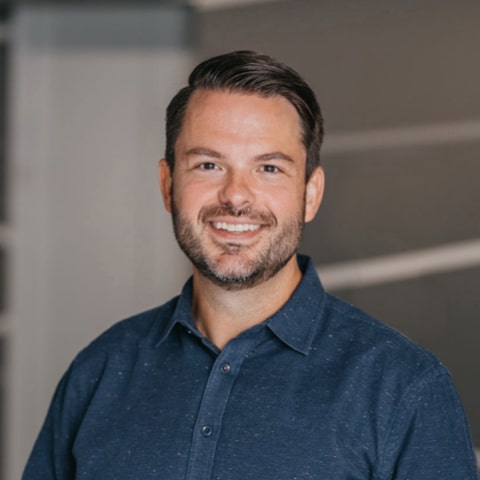
Cory Wheeler
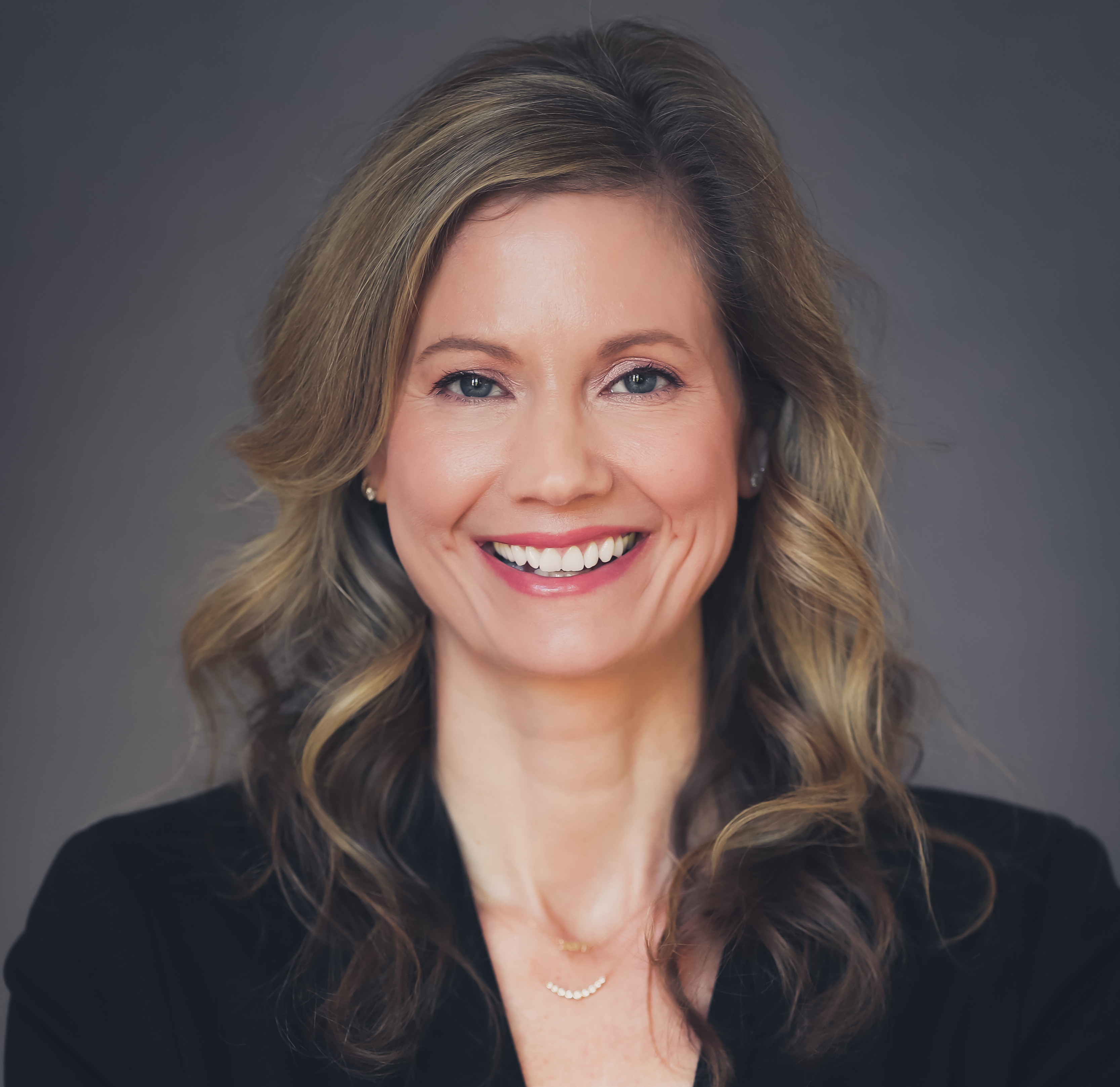
Meredith Albertson
Today's Guests
